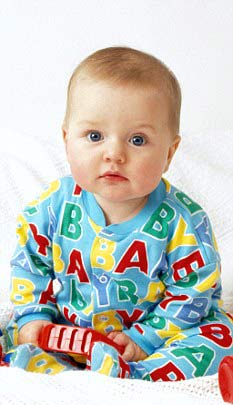|
 The vocabulary of babies who are bilingual remains flexible as they grow up (Library image) |
|
The vocabulary of babies who are bilingual remains flexible as they grow up and boosts their speaking ability as toddlers, a university study has found. Babies and children have a great ability to learn a second language but that begins to fade as early as their first birthdays. Now researchers at the University of Washington's Institute for Learning & Brain Sciences are investigating the brain mechanisms that contribute to infants' prowess at learning languages, with the hope that the findings could boost bilingualism in adults, too. In the research, the scientists report that the brains of babies raised in bilingual households show a longer period of being flexible to different languages, especially if they hear a lot of language at home. The researchers also show that the relative amount of each language - English and Spanish - babies were exposed to affected their vocabulary as toddlers. The study, published in Journal of Phonetics, is the first to measure brain activity throughout infancy and relate it to language exposure and speaking ability. 'The bilingual brain is fascinating because it reflects humans' abilities for flexible thinking - bilingual babies learn that objects and events in the world have two names, and flexibly switch between these labels, giving the brain lots of good exercise,' said Patricia Kuhl, co-author of the study and co-director of the UW's Institute for Learning & Brain Sciences. Kuhl's previous studies show that between 8 and 10 months of age, monolingual babies become increasingly able to distinguish speech sounds of their native language, while at the same time their ability to distinguish sounds from a foreign language declines. For instance, between 8 and 10 months of age babies exposed to English become better at detecting the difference between 'r' and 'l' sounds, which are prevalent in the English language. This is the same age when Japanese babies, who are not exposed to as many 'r' and 'l' sounds, decline in their ability to detect them. (Read by Christine Mallari. Christine Mallari is a journalist at the China Daily Website.) (Agencies) |
一項大學研究發現,接受雙語教育的寶寶在成長過程中可以靈活地掌握兩門語言的詞匯,而且學步時期的口語表達能力也能有所提高。 嬰兒和兒童在學習第二門語言方面能力很強,但早在他們過第一個生日的時候,這種能力就開始逐漸退化。 目前,華盛頓大學學習與腦科學研究所的研究人員們在對促進嬰兒非凡的語言能力的大腦機制進行研究,他們希望研究結果也可以推動成人的雙語教育。 在研究中,科學家們報告說,成長在雙語家庭中、特別是在家能聽到大量語言交流的寶寶的大腦表現出更長時間的對不同語言的靈敏度。 研究者們還揭示說,在嬰兒時期接觸到的各種語言(英語或西班牙語)的數量,會影響到他們學步時期的詞匯量。 這項發表在《語音學期刊》上的研究第一次對嬰兒時期的大腦活動進行測量,并將其與語言環境和口語能力聯系起來。 帕特麗夏?庫爾是該研究的合著者之一,也是華盛頓大學學習與大腦科學研究所的副主任,她說:“雙語大腦很棒,因為它可以反映出人類靈活思維的能力。雙語寶寶們認識到世界上的物體和事件都有兩個名稱,并能在不同的名稱之間靈活轉換,這給了大腦很多有益的鍛煉。” 庫爾之前的研究顯示,只接觸一種語言的寶寶在8個月到10個月大的時候分辨母語語音方面能力會日益增強,但與此同時,分辨外語語音的能力卻減弱了。 比方說,接觸英語的寶寶們在8個月至10個月大的時候會更容易分辨r和l兩個音的區別,而這兩個音在英語中很普遍。 而同年齡的日本寶寶們沒有接觸到那么多的r和l,所以他們分辨出這兩個音的能力也在下降。 相關閱讀 (中國日報網英語點津 實習生沈清 編輯:陳丹妮) |
|
Vocabulary: prowess: 非凡的能力;高超的本領 label: 稱號 prevalent: 普遍的 |
